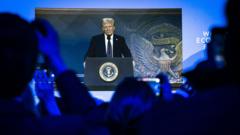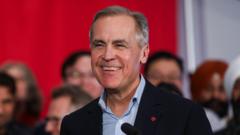As world leaders gather in Davos, President Trump uses his platform to assertively project an 'America First' agenda, explicitly suggesting Canada could become a US state to sidestep tariffs. Balancing charm with intimidation, Trump lays out his goals to revamp global trade, leaving many attendees caught between admiration and concern.
Trump’s Davos Ultimatum: An Economic Power Play at the World Economic Forum

Trump’s Davos Ultimatum: An Economic Power Play at the World Economic Forum
At the World Economic Forum in Davos, President Trump issues a stark message packed with charm and threats to the global elite, revealing a brewing international economic confrontation.
In the picturesque Swiss town of Davos, where luminaries from various sectors convened for the World Economic Forum, an unexpected player made his entrance: President Donald Trump, remotely connecting from the White House with a politically charged message. As he aims for a resurgence in his second presidential term, Trump's address blended bold assertions with veiled threats, indicating a determined effort to reshape the international economic landscape.
“Nothing will stand in our way,” he declared, setting the stage for a revival of the American economy while simultaneously signaling potential tariffs for countries that refuse to relocate manufacturing to the US. His remarks hinted at “trillions of dollars” in tariffs poised to impact foreign businesses exporting to the US market—a call to action that elicited reactions of disbelief from the global elite, particularly concerning his offhand suggestion that Canada might become a state to bypass trade penalties.
During his discourse, Trump commanded the attention of business magnates and world leaders alike, juxtaposing amiable rhetoric with pointed criticisms directed at figures like Bank of America head, Brian Moynihan, regarding his treatment of conservative clients. Amid various dynamics—diplomatic and financial—the gathering witnessed a vivid clash of ideologies, with Trump's "America First" mantra sparking discussions about its implications for global commerce.
As Trump emphasized a strategy aimed at reducing energy costs by pressuring oil-rich nations like Saudi Arabia, attendees were left to ponder the ramifications of his proposals on the broader geopolitical climate, particularly with an eye on the ongoing conflict in Ukraine. Noteworthy figures, including Christine Lagarde and John Kerry, attended the assembly, each contending with the provocative nature of Trump's campaign-style rhetoric that could potentially jeopardize established alliances.
The narrative of a disrupted global trading system loomed over discussions, casting uncertainty among US CEOs contemplating the retaliatory moves their companies might take should tariffs be enforced. While some leaders rallied for rational dialogues to prevent escalated tensions, Canada's response is already brewing against possible US tariff actions.
Amid the palpable tension in Davos, the US tech advantage, embodied by innovators such as Jeff Bezos and Tim Cook, painted a complicated picture. Here, the undercurrents of competition with China emerged, prompting speculation on whether the allure of American advancements might be mirrored internationally by Europe, as allies seek to capitalize on discontent within the US political landscape.
In this intrigue-filled week, the broader fallout from Trump’s assertions about global trade will take hold, shaping international relations and economic treaties for the foreseeable future. The next phase of this evolving narrative remains unforeseeable, but the ripples from Davos promise to be felt deep into the global economic order as the world calibrates its response to Trump's vision.























